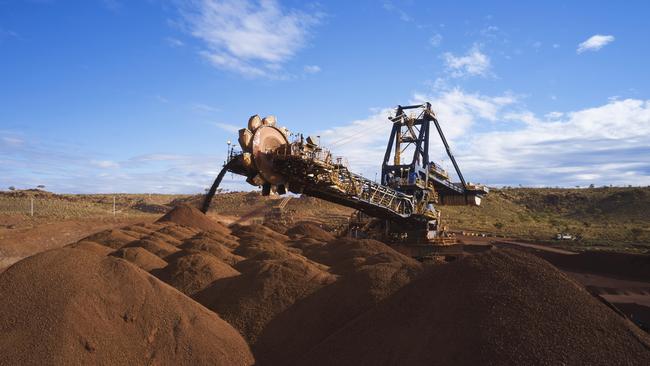
It is there again this year, helpfully accompanied by charts and graphs to illustrate what it describes as the $12bn “subsidy” WA has sent to the other states over the past five years due to the fact it receives less GST revenue than it generates.
While WA has 10.7 per cent of the national population, it receives only 7.5 per cent of the national GST pool. But there’s another per capita measure that is far more significant, but which you won’t find anywhere in the WA budget papers.
That is the per capita share of the mining royalties generated across the country. The imbalance in WA’s favour far outweighs any disadvantage in the way the GST is carved up.
The Australian has examined the past few years of budget papers for every state and territory to compare how the mining royalties windfall compares. On that front, WA is billions of dollars ahead of anyone else, even after the $12bn GST “subsidy”.
The 10.7 per cent of people who call WA home shared in 53 per cent of the nation’s mining royalties income.
Over the past four years, WA’s Treasury coffers have received more than $43bn in mining royalties, the vast bulk of which are linked to the state’s massive iron ore mines.
On a per capita basis, West Australians have reaped more than $15,400 each in mining royalties over the past four years. The average for the rest of the country is just over $1630. Victorians have collected less than $80 each.
Those who champion the floor in the GST argue that the old method – under which a state’s GST share would fall if the state experienced a surge in mining revenues – discouraged states from fostering the development of their extractive industries. But no amount of incentives and policies can change the underlying geology.
South Australia has long been considered a leader in trying to foster its mining industry. It has helped subsidise exploration programs, carried out extensive geological surveys and generally bent over backwards in an attempt to grow its resources sector. After all those years of hard work, it collects on average around 3.5 per cent of the royalties WA does.
For Victoria to enjoy the same per capita royalty collection as WA, it would need to export around 2.5 billion tonnes of iron ore a year. The total worldwide market for seaborne iron ore is 1.5 billion tonnes a year.
WA overwhelmingly owes its financial success not to any particular exceptionalism, but rather the unique quirk of having a state border that gives it access to royalties from the resources in one-third of a continent.
Alice Springs geographically is closer to the big iron ore mines of the Pilbara than Augusta, but the residents of the picturesque seaside town on WA’s southern tip enjoy the fruits of WA’s royalties bounty while those struggling in the middle of the Northern Territory do not.
The inequity in the way the nation’s mining royalties are distributed is far greater than any inequity in the way the GST is carved up.
The successive surpluses delivered by Mark McGowan’s government have helped entrench the Premier’s position as a social progressive and economic conservative – an ideological mindset that echoes that of a large portion of the WA population. But the downside of his economic success is that it now appears all but impossible for any fair-minded future federal government to maintain – or even, as WA would argue, improve – WA’s share of GST revenues.
But if and when that GST floor is finally unwound, WA will have billions and billions of dollars in mining royalties to help keep it warm.




Every year, Western Australia’s budget papers include a section devoted to lamenting the state’s meagre share of GST revenues.